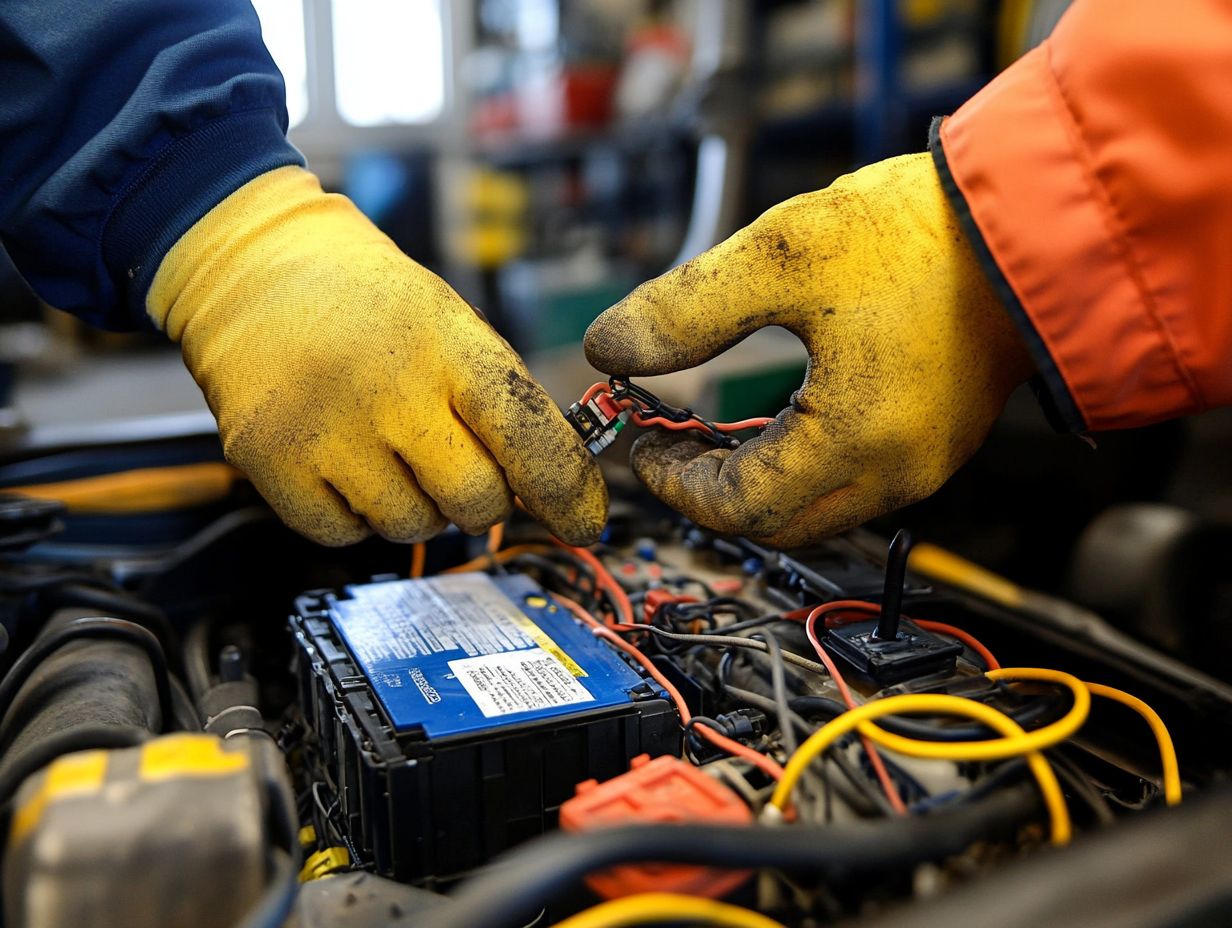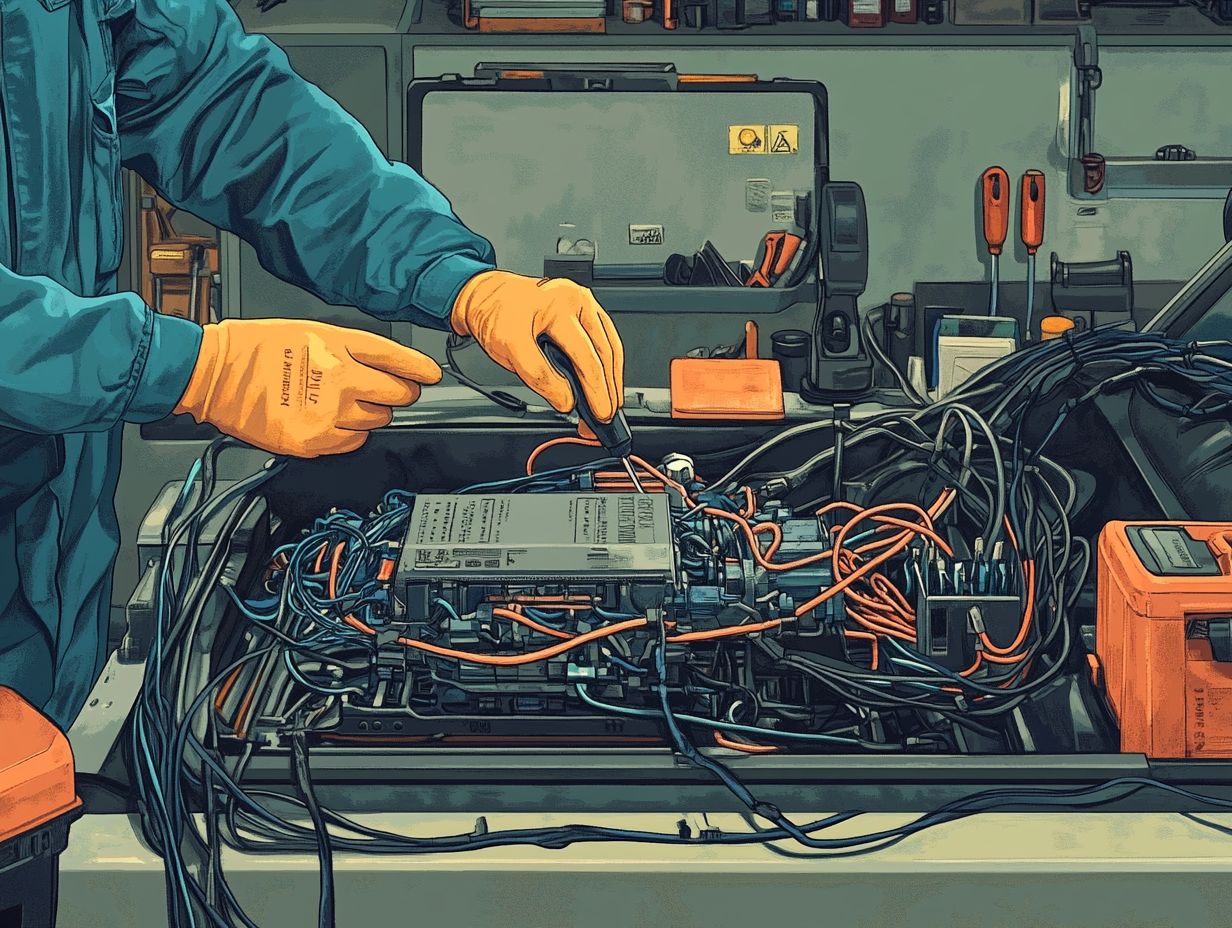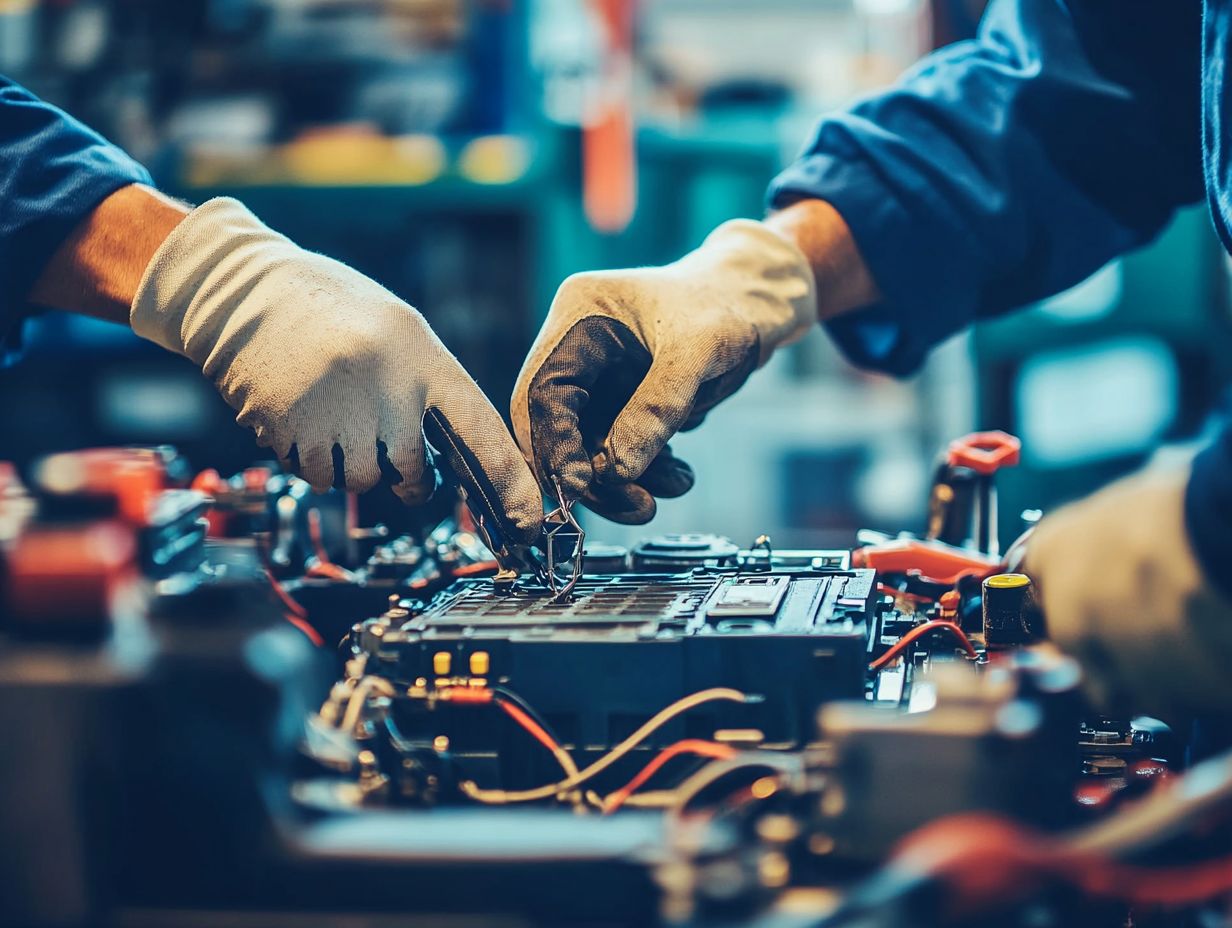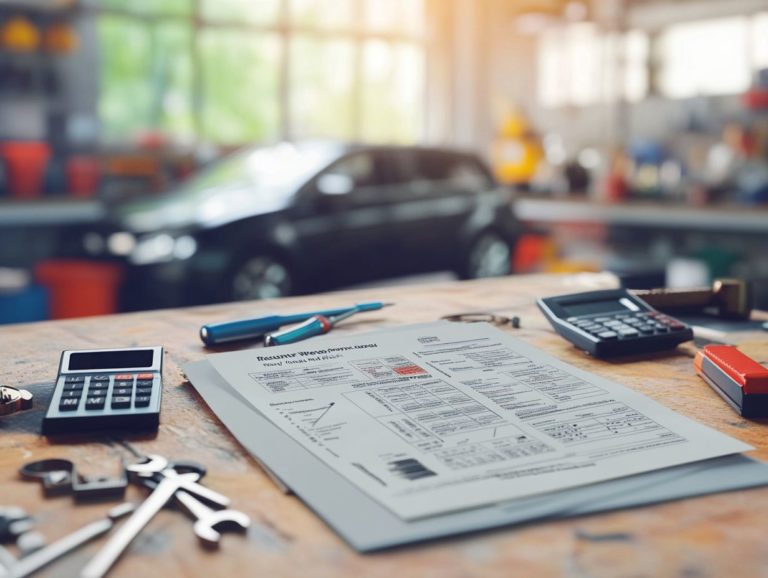How to Maintain Your Car’s Electrical System
Your car’s electrical system is the unsung hero. It quietly powers everything from your headlights to your radio.
Understanding its components and functions is essential for smooth vehicle operation.
This article delves into the common signs of electrical issues. It outlines a maintenance schedule to keep everything in tip-top shape and guides you on when to roll up your sleeves for repairs versus when to call in the professionals.
You will discover practical tips to prevent electrical failures. This will help keep your car dependable for years to come.
Contents
- Key Takeaways:
- Understanding Your Car’s Electrical System
- Signs of Electrical System Issues
- Regular Maintenance for Your Electrical System
- Replacing and Repairing Electrical Components
- Troubleshooting Electrical Problems
- Preventing Electrical System Failure
- Frequently Asked Questions
- What components make up a car’s electrical system?
- How often should I check my car’s battery?
- Can extreme temperatures affect my car’s electrical system?
- Do I need to replace my car’s battery regularly?
- How can I maintain my car’s alternator?
- What are common signs of a failing electrical system in a car?
Key Takeaways:

- Regular maintenance is key to keeping your car’s electrical system functioning properly. Follow the recommended schedule and don’t ignore warning signs.
- DIY repairs may save you money, but know when it’s best to leave it to the professionals. Troubleshoot issues step by step to identify and fix problems.
- Proper care and maintenance will prevent electrical system failure and keep your car running smoothly. Take note of tips to maintain your car’s electrical system and avoid costly repairs.
Understanding Your Car’s Electrical System
Grasping the intricacies of your car’s electrical system is essential for achieving peak performance, but it’s equally important to understand how to maintain your car’s fuel system to ensure safety on the road.
This system consists of several key components, including the battery, starter, alternator, and energy storage devices. All of these are vital for your vehicle’s functionality.
An elaborate network of electrical connections collaborates seamlessly to power everything from the ignition system to the headlights. It’s crucial for both car enthusiasts and everyday drivers to familiarize themselves with these electrical fundamentals.
A solid understanding not only enables you to perform preventive maintenance and timely repairs but also helps you tackle potential issues before they evolve into costly complications.
Components and Functions
The core components of your vehicle’s electrical system consist of the battery, starter, and alternator. Each serves a unique purpose in the operation of your automobile.
Think of the battery as the primary power source. It provides the vital voltage needed to initiate the engine’s roar.
Once the engine is purring, the alternator steps in, converting mechanical energy into electrical energy. This not only keeps your battery charged but also powers essential features like headlights, infotainment systems, and climate control.
Meanwhile, the starter acts as the ignition system’s essential gateway. It harnesses the battery’s energy to ensure that the engine turns over effortlessly.
Together, these components work in harmony to deliver a seamless driving experience, showcasing the intricate balance that exists within your vehicle’s electrical system.
Signs of Electrical System Issues
Spotting electrical issues early can save you from unexpected breakdowns and costly repairs. Stay alert to keep your car running smoothly!
Look out for common indicators such as dimming headlights, erratic battery performance, or warning lights illuminating your dashboard.
If you observe any of these symptoms, it’s vital to conduct a meticulous inspection of the battery cables and electrical connections. Checking the electrical system can help identify the root cause of the malfunctioning system.
Common Warning Signs
Common warning signs of electrical issues in your vehicle can show up in several ways. Dimming headlights are among the most obvious indicators.
It’s essential to pay attention to other symptoms that might arise, like erratic power delivery or trouble starting the engine.
These signs often hint at underlying problems within your vehicle’s electrical system. Ignoring them can escalate into more serious issues.
For example, if you find the engine struggling to turn over or the lights flickering while you re driving, it could indicate a weakening battery. In such cases, deciding to replace the car battery could spare you from unexpected breakdowns.
Additionally, inspecting your battery terminals for corrosion and using a corrosion removal chemical can greatly improve performance and extend the life of your battery.
Regular Maintenance for Your Electrical System

Regular maintenance of your vehicle’s electrical system is crucial for preventing unexpected failures and extending the lifespan of vital components. By following the basics of car electrical system maintenance, you can establish a preventive maintenance schedule that helps you avert costly repairs and ensures your vehicle operates at peak efficiency.
This should include routine inspections of the drive belt and serpentine belt, as both play a critical role in delivering power to various systems, including electrical components. Additionally, knowing how to maintain your car’s air conditioning system is crucial. By investing in comprehensive maintenance services, you can effectively protect your vehicle against potential electrical failures.
Recommended Maintenance Schedule
A well-structured maintenance schedule is essential for keeping your vehicle’s electrical system in top condition and minimizing the risk of failure. For more insights, check out this guide on how to maintain your car’s electrical system.
Regular preventive maintenance is key to ensuring the longevity and optimal performance of your electrical components. It significantly reduces the chances of unexpected breakdowns.
Conduct thorough inspections every six months, focusing on critical areas like battery health and electrical connections. General electrical diagnostics should be performed annually to catch potential issues before they escalate.
Routine checks of fuses, cables, and connectors should also be part of your schedule to guarantee smooth operation. By sticking to this timetable, you ensure reliable functionality and enjoy peace of mind while on the road.
Replacing and Repairing Electrical Components
Replacing and repairing electrical components in your vehicle can be manageable if you understand when to take matters into your own hands and when it s best to call a qualified mechanic.
When to DIY and When to Seek Professional Help
Knowing when to attempt DIY repairs and when to call in a professional can greatly enhance your ability to manage your vehicle’s electrical system, as well as understanding how to maintain your car’s exhaust system.
For many car owners, handling simple tasks like replacing a car battery or changing the oil can be satisfying and budget-friendly. These straightforward maintenance tasks allow you to gain hands-on experience with your vehicle.
However, it s essential to recognize when a problem goes beyond basic fixes. Complex electrical repairs often involve intricate wiring and components that can easily baffle even the most seasoned DIY enthusiast.
Understanding these boundaries ensures you can enjoy your DIY victories while knowing when to seek the expertise of a qualified professional to avoid worsening the situation.
Troubleshooting Electrical Problems
Troubleshooting electrical problems in your vehicle is essential for pinpointing underlying issues that could lead to system malfunctions. Addressing these problems promptly ensures your vehicle operates safely and reliably.
Steps to Identify and Fix Issues

Identifying and resolving issues within your vehicle’s electrical system requires meticulous troubleshooting steps. This organized diagnostic approach allows you to efficiently pinpoint trouble spots.
Start by visually inspecting the electrical connections for any signs of corrosion or loose wiring, which can disrupt the flow of power. Next, examine the battery for signs of wear or a low charge, then check the starter to confirm its proper functioning.
Don t overlook the alternator, as it plays a vital role in charging the battery and powering various electrical components. By diligently following these steps, you can streamline the process of identifying any electrical troubles in your vehicle.
Preventing Electrical System Failure
Preventing electrical system failure is crucial for ensuring your vehicle’s reliability and performance. One important aspect is learning how to maintain your car’s cooling system, as it all starts with implementing effective preventive measures.
Don’t wait tackle your vehicle’s electrical health today!
Tips for Maintaining Your Car’s Electrical System
Effective maintenance of your car’s electrical system is simpler than it may seem. Following how to maintain your car’s electrical system can ensure everything runs smoothly with just a few essential tips.
Regular check-ups can extend the lifespan of your components. Start with a thorough inspection of electrical connections to ensure they re secure and free from rust. Using special cleaning products for removing rust will help preserve the integrity of these vital connections, which is crucial for optimal performance.
Don’t overlook the battery, starter, and alternator; these are the heart of your vehicle’s electrical system. Additionally, understanding how to maintain your car’s transmission is also crucial for overall performance.
Schedule regular check-ups to inspect electrical connections. This will help you catch potential issues early, ultimately saving you both time and money in the long run.
Frequently Asked Questions
What components make up a car’s electrical system?
A car’s electrical system consists of the battery, alternator, starter, and various wiring and fuses.
How often should I check my car’s battery?
Make it a habit to check your car’s battery every month for top performance!

Can extreme temperatures affect my car’s electrical system?
Yes, extreme temperatures can impact your car. Cold weather reduces battery power, while heat can lead to overheating of components.
Do I need to replace my car’s battery regularly?
Yes, car batteries typically have a lifespan of 3-5 years. It’s recommended to replace them within that time frame to avoid any potential issues.
How can I maintain my car’s alternator?
To maintain your car’s alternator, ensure the battery connections are clean and tight. Check that the belts are in good condition, and learn how to maintain your car’s suspension system regularly to confirm it’s functioning properly.
What are common signs of a failing electrical system in a car?
Common signs of a failing electrical system include dimming headlights, slow engine cranking, dashboard warning lights, and a dead battery.





